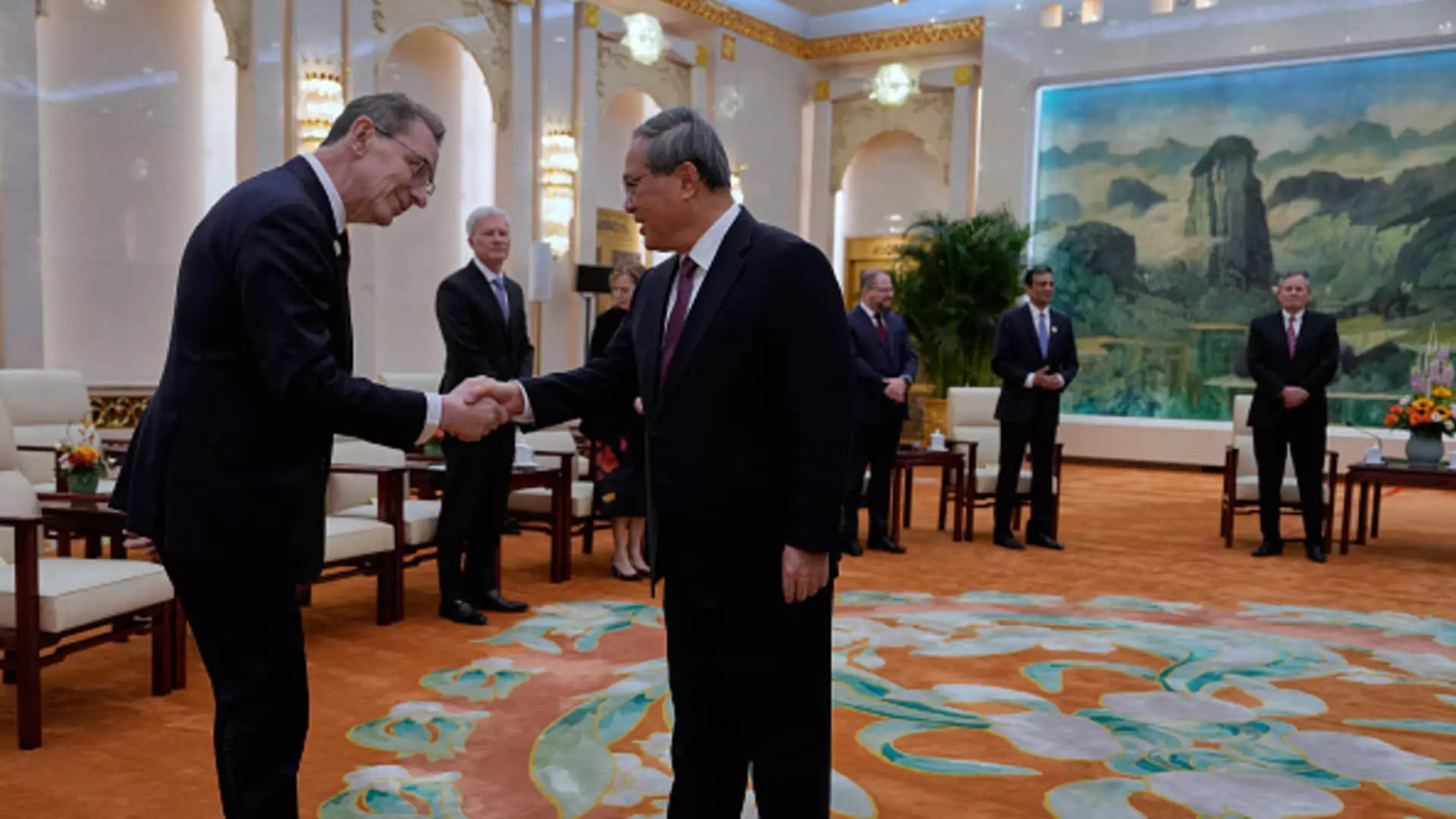The recent visit by U.S. Republican Senator Steve Daines and a cadre of seven prominent CEOs to China marks a notable moment in U.S.-China relations, but it also serves as a stark reminder of the pitfalls that accompany diplomatic engagement with authoritarian regimes. Daines’ meeting with Chinese Premier Li Qiang reflects a broader strategic dialogue, yet it raises eyebrows regarding the motivations behind such engagements. While fostering cooperation is essential, one must question whether these high-profile encounters are simply veils for economic concessions that compromise American principles.
The need for dialogue, as emphasized by Li in his discussion with Daines, highlights the precarious balance that must be maintained in international relations. However, history teaches us that dialogue does not equate to genuine engagement. Daines, who has previously supported tariffs and tough measures against China, now seems to advocate for a softer approach. Is this a shift in principle or merely a politically expedient tactic aimed at economic gain? The question remains controversial, especially considering the broader implications for American foreign policy.
American Business Interests: A Double-Edged Sword
During Daines’ trip, he introduced seven CEOs from titans such as Qualcomm and Pfizer, emphasizing their collective experience spanning over 275 years in China. This statistic sounds impressive, yet it also exposes a convoluted truth: American corporations have historically prioritized profit margins over ethical considerations. In many cases, these companies have turned a blind eye to human rights abuses and authoritarian practices in exchange for access to Chinese markets. Is this kind of complicity acceptable in the name of commerce?
Moreover, as the U.S. grapples with a rising tide of anti-China sentiment driven by concerns over trade imbalances and national security, approvals of such visits by influential figures could run the risk of fueling backlash at home. Daines and the executives may envision this visit as a pathway to unbarriered trade, yet they must remain vigilant about the potential consequences that blind allegiance to foreign markets can impose on domestic public opinion. Striking the right balance between securing business interests and upholding American values is a complex challenge, one this visit may inadvertently escalate.
Fentanyl: A Looming Policy Wake-Up Call
A key point in Daines’ dialogue with Chinese officials was the critical issue of fentanyl precursors—the same substances that have devastated communities back in America. It’s commendable he raised this pressing concern, but the question arises: Will mere dialogue lead to substantive action? Historically, China has denounced responsibility for the fentanyl crisis while the U.S. pushes for accountability—a narrative that needs urgent reevaluation.
Daines’ friendly overtures risk downplaying the urgency of this public health crisis. The specter of compromise with an authoritarian government over such a severe issue cannot be overlooked. True engagement on substantive issues should not only involve commercial interests but also enforce strict accountability on matters of life and death. A failure to prioritize this issue could lead to catastrophic implications domestically, undermining any transient diplomatic gains achieved during such high-profile visits.
American Image and Global Standing
As the world observes Daines’ visit as the first by a U.S. politician since President Trump took office, the implications for the American image abroad are profound. Criticism from various corners highlights the notion that increased engagement without a firm stance on critical human rights issues projects an image of weakness and inconsistency. Daines, in navigating this dual engagement, risks alienating not only constituents at home but also potential partners around the globe who support ethical foreign policy initiatives.
If the U.S. continues down this pathway of prioritizing corporate profits and dialogue over principled negotiation and confrontation, will it inadvertently validate repressive regimes? This approach could tarnish the image of America as a champion of democracy. Moreover, consistency is key in foreign policy; thus, any appearance of concession to human rights violations will undoubtedly cause skepticism among international allies and enemy states alike.
The implications of Daines’ visit present both opportunities and significant risks for the future of U.S.-China relations. America must tread carefully, ensuring that economic pursuits do not overshadow its foundational values, especially when engaging with a nation that has repeatedly challenged those values on the global stage. The question remains whether such high-profile visits can catalyze genuine, positive change, or will they merely be taps on the shoulder of an adversary, leading to more harmful repercussions at home?



Leave a Reply